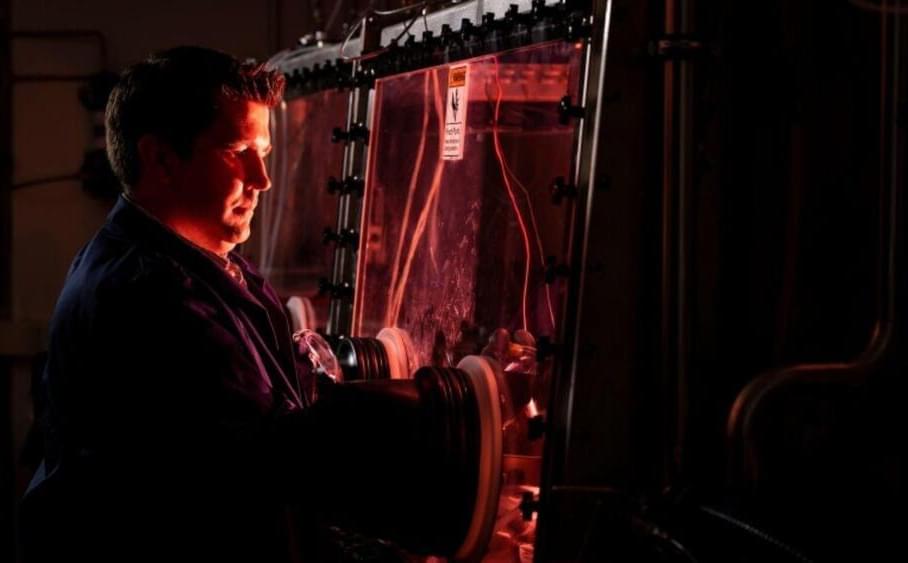Research could help protect satellites and astronauts from the solar wind.



A multidisciplinary team from two Johns Hopkins University institutions, including neurotoxicologists and virologists from the Bloomberg School of Public Health and infectious disease specialists from the school of medicine, has found that organoids (tiny tissue cultures made from human cells that simulate whole organs) known as “mini-brains” can be infected by the SARS-CoV-2 virus that causes COVID-19.
The results, which suggest that the virus can infect human brain cells, were published online June 26, 2020, in the journal ALTEX: Alternatives to Animal Experimentation.
Early reports from Wuhan, China, the origin of the COVID-19 pandemic, have suggested that 36% of patients with the disease show neurological symptoms, but it has been unclear whether or not the virus infects human brain cells. In their study, the Johns Hopkins researchers demonstrated that certain human neurons express a receptor, ACE2, which is the same one that the SARS-CoV-2 virus uses to enter the lungs. Therefore, they surmised, ACE2 also might provide access to the brain.

That’s because as a white dwarf draws material away from its hydrogen-burning partner, the stolen gas follows the star’s magnetic field lines in a big, curving arc toward its new home. And in the process, it drains energy from the stars’ whirling dance (so do the gravitational waves produced by their rotation). When that happens, both stars fall toward the shared center of gravity they’re orbiting. Closer orbits also mean shorter orbits, so it takes the stars less time to complete a single lap.
And the closer the stars get, the stronger the gravitational waves they produce, which drains away more energy, so they fall even closer together. By the time they’re close enough to complete an orbit in just a handful of minutes, the donor star has usually run out of hydrogen. That’s why the really close, fast-orbiting cataclysmic binaries tend to be a white dwarf and a helium-burning star.
The plant was developed by the Institute of Engineering Thermophysics (IET) of the Chinese Academy of Sciences and can generate more than 132 million kWh of electricity annually. This will see 40,000–60,000 households equipped with power during peak electricity consumption. From an environmental perspective, it also offers promising results, saving 42,000 tons of standard coal and reducing carbon dioxide emissions by 109,000 tons annually, stated IET.
What is CAES?
CAES is a type of battery that uses off-peak or surplus electricity from the grid to produce energy. It does this by using that extra electricity to run a compressor which in turn generates heated compressed air. This air is stored inside a purpose-built underground cavity, where hydrostatic pressure pushes it back to the surface.

The new system uses molten salts instead of traditional fuel rods.
The world is rethinking nuclear power plants in the face of climate change. Your average plant produces 8,000 times more power than fossil fuels and is environmentally friendly. There’s one massive caveat, though, in the form of nuclear disasters, such as the 1986 Chernobyl incident and the 2011 Fukushima disaster.
Now, professor Matthew Memmott and colleagues from Bingham Young University (BYU) announced that they designed a new molten salt micro-reactor system that allows for safer nuclear energy production. As per a press release, it may also solve a number of other key issues related to nuclear energy production.
Photo by brooklyn jarvis kelson/byu photo.
Your average plant produces 8,000 times more power than fossil fuels and is environmentally friendly. There’s one massive caveat, though, in the form of nuclear disasters, such as the 1986 Chernobyl incident and the 2011 Fukushima disaster.

The 40-square-meter hydroponic farm cultivates lettuce under LED lighting without using pesticides.
In an effort to provide passengers with amenities beyond transportation, Taiwan has chosen an unusual location for vertical farming, an underground metro station.
Nanjing Fuxing station in Taipei cultivates vegetables in a technologically advanced setting that assures precisely controlled humidity, temperatures, and other elements promoted as a method of cultivating unpolluted and healthy plants, Taiwan News reported on Wednesday.
In order to fulfill a high demand for sustainable, clean and organic food, Taiwan is looking for alternative spaces to grow vegetables.
The massive launch system will carry a mysterious U.S. Space Force payload to a high-altitude geosynchronous orbit.
It’s been a while since SpaceX launched Falcon Heavy to orbit. A string of payload delays has stopped the heavy-duty rocket from hitting the launch pad since the summer of 2019.
Now though, as per a report from SpaceFlightNow, a military spokesperson has announced Falcon Heavy may finally fly again as soon as October 28 from Kennedy Space Center in Florida. The 28-engine rocket, SpaceX’s most powerful operational launch system, will lift a delayed national security mission for the U.S. Space Force.
SpaceX’s Falcon Heavy will finally fly again.
SpaceX could finally launch Falcon Heavy again this month after a three-year hiatus. The massive launch system will carry a mysterious U.S. Space Force payload to a high-altitude geosynchronous orbit.

This could help us understand diseases better.
Researchers at the University of Utah have developed seed-sized brain organoids that can not only organize themselves but also provide us insights into the causes of autism, a press release said.
Organoids, tiny clusters of tissue derived from stem cells, allow researchers to replicate the complex organs outside the body while also controlling conditions around them… More.
Yueqi Wang.
Studying the diseases of the brain is often challenging since it is difficult for scientists to study the organ’s inner workings. Although advances in technology allow us to image the brain to a certain degree, there is a lot that we still need to learn about how the brain develops.

Fiction will become reality at the 2022 Monaco Yacht Show.
Dutch yacht builder U-Boat Worx has unveiled the design of its $25 million superyacht, Nautilus.
More than 150 years ago, Jules Verne’s 20,000 Leagues Under the Sea first brought to our attention the possibility of a luxury yacht that could take an underwater dip at will. Over the years, the concept has been admired and looked up to by many engineers but building a real-world prototype has so far still been a dream.

Discarded electronic devices, such as cell phones, are a fast-growing source of waste. One way to mitigate the problem could be to use components that are made with renewable resources and that are easy to dispose of responsibly. Now, researchers reporting in ACS Applied Materials & Interfaces have created a prototype circuit board that is made of a sheet paper with fully integrated electrical components, and that can be burned or left to degrade.
Most small electronic devices contain circuit boards that are made from glass fibers, resins and metal wiring. These boards are not easy to recycle and are relatively bulky, making them undesirable for use in point-of-care medical devices, environmental monitors or personal wearable devices.
One alternative is to use paper-based circuit boards, which should be easier to dispose of, less expensive and more flexible. However, current options require specialized paper, or they simply have traditional metal circuitry components mounted onto a sheet of paper. Instead, Choi and colleagues wanted to develop circuitry that would be simple to manufacture and that had all the electronic components fully integrated into the sheet.